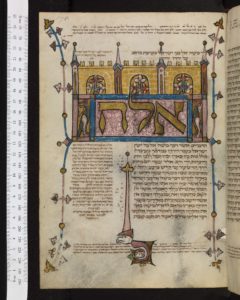This workshop, whose first issue was in 2016, aims to impart hands-on expertise in the core areas of Hebrew manuscript studies—codicology, palaeography, and illumination—and includes an introduction to the Bodleian Libraries’ Hebrew and Judaica manuscript collections as well as to the conservation and bindings of these collections.

The workshop’s lecturers are authorities in their fields and its alumni have gone on to work on many of the main Judaica collections in Europe, Israel, and North America. The goal of the workshop is to enable scholars in Jewish Studies and Manuscript Studies throughout the United Kingdom, Europe, Israel, and elsewhere to acquire expertise in Hebrew manuscripts which will enable them to work on collections mainly in Europe, many of which remain to date unexamined or inadequately catalogued and studied.
Throughout the different iterations of the workshop thus far, the following themes have been addressed:
- Bodleian Libraries’ Hebrew and Judaica manuscript collections
- Scribes at work: cultural, economic, and cognitive aspect of writing
- Books and documents as physical artifacts: writing materials, their elaboration, use, and modern analysis; manuscript supports (parchment, paper, etc.), their characteristics, manufacture, and analysis; bindings, their types and the effect they have on the codices; quire composition
- Typology of Hebrew scripts (Oriental, Sephardi, Byzantine, Yemenite, Italian, Ashkenazi)
- Script versus handwriting
- Page layout and text layout as means of organisation of knowledge
- Scribes, copyists, and medieval Hebrew text transmission
- Hebrew book production techniques: context and economy
- Visual language and the making of the Hebrew manuscript
- Hebrew illumination between decoration and illustration
- Techniques of book production as a meeting place between cultures
- Conservation of Hebrew books
- Bindings of Hebrew books